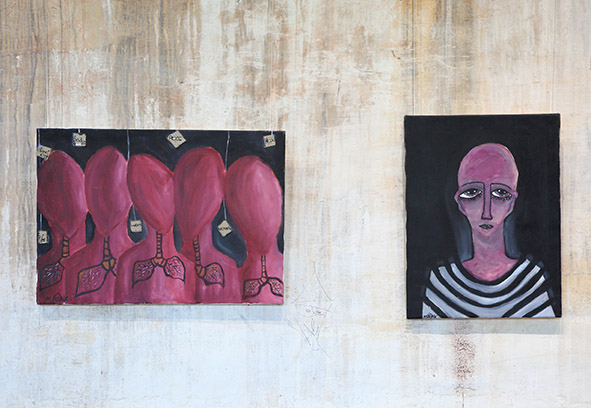Top image: Art by Gazan artist Malak Mattar on display at Greenbelt Festival 2022
Paul Northup, Greenbelt’s Creative Director reflects on the current situation in Israel-Palestine.
We’ve been overwhelmed with emotions since the early hours of Saturday 7 October. We haven’t known what to say or do. We’re sure we’re not alone. The atmosphere has been febrile.
We knew in our hearts and in our guts that morning – as the first reports of Hamas militants having broken through the Gaza perimeter and into southern Israel, killing so many with such savagery so indiscriminately, taking so many hostages and wreaking such horror and devastation on a scale not seen before – that we were in a whole new era. We dared not think of what the repercussions would be. But they have played out since with a horrid inevitability.
Of course, the world isn’t waiting for what Greenbelt might say about this. But, as a space and community where Christians and those of good faith have gathered for fifty years and where one of the main global stories we have sought to tell has been the story of the Palestinians (from Elias Chacour in the 1980s onward), we have to say something.
Not least because we’ve been a small part of challenging the church’s one-time blanket buy-in to notions of Israel’s divine theological right to the (holy) land. We’ve sought to be part of a movement that has wanted to better understand the history, the geo-politics and the human rights issues ‘on the ground’. We’ve taken Greenbelters (together with our friends at Amos Trust) to Israel-Palestine since 2008. We’ve seed-funded the Bet Lahem Live festival in Bethlehem, supported the Palestine Music Expo in Ramallah, and consistently platformed Palestinian and Israeli activists, speakers and artists working for peace and justice in the land once called Holy. Paying attention to equal rights for Palestinians has long been one of our primary festival focusses. We have done this because their voices and presence seemed marginalised in the mainstream. Their struggle has been one that has been ignored at worst or misunderstood at best.
This isn’t a new story. We are involved in its telling and its unfolding. No matter how hard it is.
Just to be clear and to return to the top: no one should condone Hamas’ savagery in southern Israel on 7 October. It was sickening – striking absolute horror, fear and dread into all. The sheer numbers of people murdered and the ways in which they were butchered cannot be downplayed. This was a sickening and seminal moment for Israel and Israelis.
But neither do we buy into the implications of the free-floating, ahistorical and easy rhetoric from leaders around the world who have unequivocally parrotted that Israel has unfettered the ‘right to defend itself’. Every nation state has a duty to keep its citizens safe. But the way in which Israel has exercised and expressed this right has, for decades, involved the systematic occupation, repression and control of the Palestinians living in Gaza and the West Bank. And this has made it less, rather than more safe, it would seem.
The sophisticated blockade fences around Gaza and the Separation Wall in the West Bank are there on the premise solely of security. But in reality they are about control, colonisation and land. As we have so horribly seen, they do not ultimately guarantee safety and security. A different approach is needed. One that puts violence to one side.
And it’s time for the international community to be more honest about Israel’s exceptionalism when it comes to international law. How can global leaders now call for restraint and adherence to international law in terms of the IDF’s military actions in Gaza when for decades they have allowed Israel to pursue the systematic establishment of an apartheid State that daily flouts internationally held notions of human rights and basic democracy?
We’ve been urged before to ‘complicate our narrative’ (when blogging on the Greenbelt website after trips to Israel-Palestine about what we’ve seen, heard and experienced on the ground). But this ‘conflict’ has been over-problematised for too long. To the point people are paralysed by its complexity, unable to even talk about it – for fear of ‘getting it wrong’, for not understanding the nuance, for only partially representing the reality and, most worryingly, for being antisemitic.
Although the history is long and winding and the way things work on the ground is mind-boggling, at the root of this seemingly intractable cycle of conflict and violence, is an asymmetrical story of two peoples – one organised into a sophisticated settler-colonial State occupier and the other increasingly marginalised, fragmented, disenfranchised, disinherited – being driven, metaphorically and physically, into the sea and the desert. Both peoples have long-standing and legitimate claims to the land. It’s time for the world to take the stories of both peoples seriously and treat them equally – without anyone having to resort to violence to make their point.
The horrible irony is that if the international community want to see peace and justice for all in Israel-Palestine, then to allow Israel to behave as it is, then it is not supporting Israel. We need to support Israel in finding other, better ways to coexist with Palestinians. As it says at the Tent of Nations, ways that refuse to see others as enemies.


